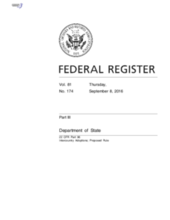This page contains documents and other resources related to children's care in the Americas. Browse resources by region, country, or category.
Displaying 2431 - 2440 of 3116
This paper discusses the study of foster parent perspectives on decision-making relevant to the use of psychotropics with children in foster care.
This news article from IllinoisHomepage.net highlights the recent report released by the Illinois State Auditor, which reports that children who are supposed to be in foster care are spending too much time in psychiatric and other detention facilities. The report can be downloaded here from the BCN Site.
This is a Proposed Rule document from the U.S. Department of State regarding international adoptions. The Department of State (the Department) proposes to amend requirements for accreditation of agencies and approval of persons who provide adoption services in intercountry adoption cases.
This study evaluates one mid-Atlantic state’s implementation of a FGDM called family involvement meetings (FIMs) to improve family strengths and their active engagement in the service planning process.
In this opinion article from Huffington Post, Carol Emig states that there are millions of refugee children around the world who need protection. She cites Moving Beyond Trauma: Child Migrants and Refugees in the U.S., which states that more than a 127,000 children will enter into the U.S. by the end of 2016.
This opinion piece from the Washington Post discusses how working to keep children with their families is a better option
This article discusses how children's immersion in social media and video games causes them to be bored with reality. This leads them to be less cooperative, which leads to parents becoming more angry.
In this article from the Washington Post, people share stories of how they found out they were not U.S. citizens after being adopted by American parents.
This news report states that nearly half a million refugee and migrant children are in the hands of smugglers.
Global men are being challenged to take on greater roles in the local, regional and international efforts to reduce the incidences of child abuse/child maltreatment in countries worldwide, and in the day-to-day rearing of global children.


